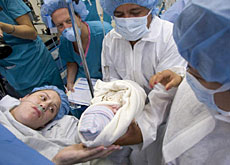Road show promotes benefits of mother’s milk

Children born in Switzerland have better odds of fighting cancer, obesity and depression than those in many other countries thanks to a high breastfeeding rate.
But health officials say mothers need to breastfeed for longer if their children are to reap the benefits. They have launched an information road show touring the country until September 29.
The first road show of its kind is stopping off at Basel, Zug, St Gallen and Lugano and offers contests and games for children as well as information for mothers on how to breastfeed and overcome potential problems.
“The number of women who breastfeed from the start is already high in Switzerland, and it’s still increasing, though slowly,” Marianne Rüttimann, head of Zurich’s La Leche League, told swissinfo.
“What we need to do now is tell them how important it is that they do it longer.”
The World Health Organization (WHO) recommends women breastfeed exclusively for at least six months, since compounds in the milk lower a child’s risk of developing high blood pressure, diabetes and certain types of cancers.
The WHO estimates that the death rate among children worldwide who die under the age of five could be reduced significantly if they are breastfed.
Mothers are also healthier for breastfeeding. The American Institute for Cancer Research in 2007 said nursing was one of the top ten things mothers could do to ward off cancer, particularly of the breast.
Yet the majority of women in Switzerland still do not reach the six month threshold.
Swiss milk
A breastfeeding study in 2003, the last time a national survey on the matter was conducted, showed that 94 per cent of all mothers breastfed exclusively following birth.
But by the time the baby was four months old, the number of mothers feeding their child exclusively breast milk had dropped to roughly one in two. At six months, the rate had dropped to one in five.
All of those figures are still higher than those gathered in 1994, the first time such a survey was taken. Experts say it is the result of a worldwide campaign called the Baby Friendly Hospital Initiative that promoted the benefits of breastfeeding and helped mothers learn how to do it properly.
“Sometimes women have problems breastfeeding so they stop,” said Sonja Merten, a medical doctor at Basel University and co-author of the study.
“Often they’ll then wait too long to get help and it can be difficult and painful for them to start breastfeeding again.”
“One of the problems we have here in Switzerland is that mothers are only given 14 weeks of maternity leave,” said Birgitta Locher, the executive director of the Swiss Foundation for the Promotion of Breastfeeding.
“That makes it very hard for women who want to go back to work to keep breastfeeding.”
To help women reach the six-month threshold, Locher says mothers should seek help immediately from support groups like La Leche League if they develop problems breastfeeding.
“Those first six months are really important,” she said. “Kids who breastfeed also have a lower risk of burn out and depression. In our time, we need that urgently.”
International comparison
Switzerland still ranks higher than other developed countries when it comes to breastfeeding rates.
A study in 2003 by the Federal Drug Administration in the United States found that fewer than three out of four women breastfed initially. After six months the figure dropped to 33 per cent, which was up from 19 per cent in 1992.
In France, a study in 1998, the most recent figures available through the WHO, showed that only one in two mothers breastfed initially.
The Germans, however, seem to embrace breastfeeding readily. A study in 1998 – again the most recent – showed 86 per cent of mothers nursed on average for six months.
swissinfo, Tim Neville
A study in the mid-1990s found that mothers in French-speaking Switzerland tend to breast feed the longest at four months.
Those in the Italian region breast-fed for about three months. German-speaking Swiss did the least, at two months.
Immigrants in Switzerland tend to breastfeed for a shorter time, though why is unclear.
There are more than 60 hospitals and birthing clinics in Switzerland that the WHO has awarded “Baby Friendly” status based on the promotion of breastfeeding. About 95% of all births in Switzerland occur in these facilities.
The WHO estimates more than one million children die each year because they were not breastfed. Worldwide no more than 40% of children are breastfed exclusively for the first six months.
Mothers who supplement breast milk with formula tend to wean children sooner than those who breastfeed exclusively.

In compliance with the JTI standards
More: SWI swissinfo.ch certified by the Journalism Trust Initiative











You can find an overview of ongoing debates with our journalists here . Please join us!
If you want to start a conversation about a topic raised in this article or want to report factual errors, email us at english@swissinfo.ch.